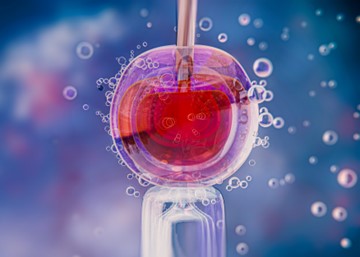A fertility treatment to help couples experiencing infertility due to male factor infertility.
In this method a single sperm is injected directly into an egg. The egg is placed in a woman’s uterus and allowed to develop into an embryo. The woman can become pregnant if the embryo successfully implants in the uterus.
Intracytoplasmic Sperm Injection (ICSI): Who Needs It?
ICSI is used primarily in cases of male factor infertility, such as,
- Low Sperm Count
- Poor Sperm Quality
- Inability to Ejaculate
- Blockage in the Male Reproductive System
ICSI helps in cases of unexplained infertility or when fertilization has failed with other treatments.
What Happens Before Intracytoplasmic Sperm Injection (ICSI)?
- Initial Evaluation: Involves physical examination, a semen analysis, hormone tests, and other tests to identify any issues that may interfere with fertility.
- Ovulation Induction: The female providing the eggs is given hormone injections for 8 to 14 days to produce more than one egg at a time.
- Egg Retrieval: Collection of eggs from the ovary
- Sperm Collection: Sperm collection takes place on the same day as the egg retrieval. The sample must be provided to the laboratory within an hour of ejaculation.
What Happens During Intracytoplasmic Sperm Injection (ICSI)?
- The sperm is first selected from a semen sample and examined under a microscope
- The sperm is then immobilized by a holding pipette and injected into the egg by a tiny micropipette
- The egg is then placed in an incubator and monitored for signs of fertilization
- Once the egg is confirmed to be fertilized, it is placed in the woman’s uterus to develop
What Happens After Intracytoplasmic Sperm Injection (ICSI)?
- The embryos are kept in an incubator in the laboratory and are monitored closely
- After 5 to 6 days, the embryos are assessed, and the best quality embryos are chosen for transfer into the uterus of the woman
- The woman will take a pregnancy test approximately two weeks later
What are the benefits of intracytoplasmic sperm injection (ICSI)?
- Increased fertility potential
- Reduces the risk of genetic disorders
- Selective fertilization (selection of the best sperm for fertilization)
- Higher success rates with frozen embryos
- Improved performance of older sperm
- Increased success with embryos with poor quality
After Intracytoplasmic Sperm Injection: When to Call Your Doctor?
Call your doctor immediately if you experience,
- Severe Abdominal Pain
- Infection
- Vaginal Bleeding
- Fever or Chills
- Swelling in the Abdomen
Myth and Fact: Intracytoplasmic Sperm Injection (ICSI)
Myth: ICSI can only be used to treat male infertility.
Fact: ICSI can be used to treat infertility in both males and females. It can also help couples conceive if there is an issue with the egg or sperm or in cases of recurrent miscarriage.
FAQ: Intracytoplasmic Sperm Injection
Who is the right candidate for Intracytoplasmic Sperm Injection?
ICSI is a fertility treatment for couples who have had difficulty conceiving due to male infertility. The right candidate for ICSI is a couple that has tried other fertility treatments without success due to male infertility.
FAQ: Intracytoplasmic Sperm Injection
What is the success rate of Intracytoplasmic Sperm Injection?
The success rate of ICSI depends on several factors, such as the age of the female partner, the cause of infertility, and the quality of the sperm. The overall success rate of ICSI is estimated to be between 40 and 70%.

